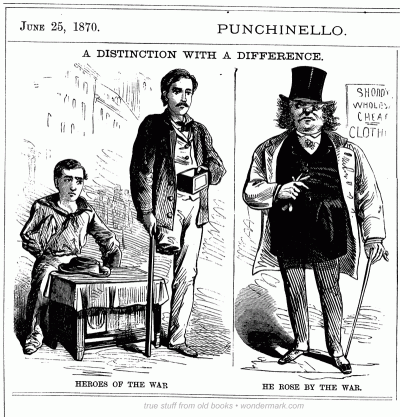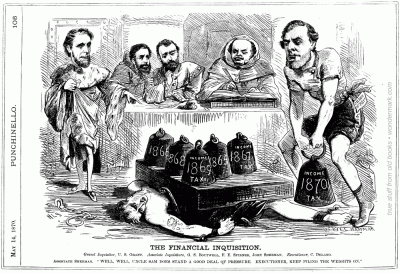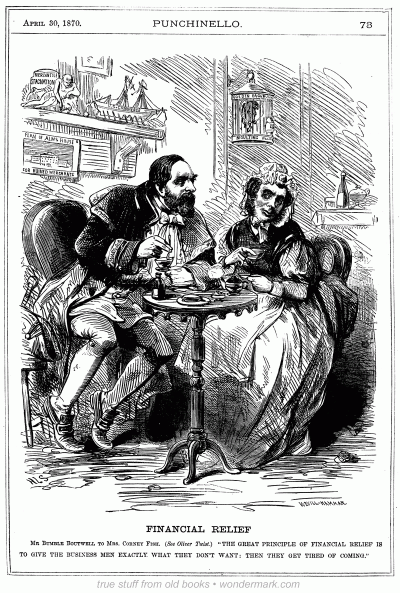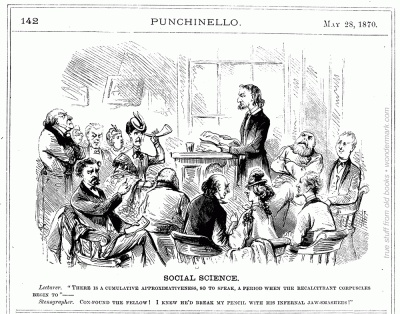These “True Stuff from Old Books” entries are from Punchinello magazine, 1870. Punchinello was a short-lived New York City spinoff of the popular British satirical weekly Punch, and like its cousin across the pond, it championed the causes of a new and growing demographic — an urban literate middle-class — while skewering the pompous in politics and society.
An example (click any of the images in this post for bigger versions):
The title reads, “A DISTINCTION WITH A DIFFERENCE.” The dismembered veterans are labeled “HEROES OF THE WAR”; the glove-toting businessman, “HE ROSE BY THE WAR.” Behind the businessman is a partially-readable sign reading “Shoddy Whole[sale] Cheap Cloth[ing].”
As long as there has been war, apparently, there have been businesses it has made prosperous.
This second cartoon is pretty self-explanatory: Uncle Sam’s being crushed by the weights of year after year of income tax in a scene reminiscent of the Spanish Inquisition; the Inquisitors are President Grant and members of his Cabinet. The caption reads:
THE FINANCIAL INQUISITION.
Grand Inquisitor, U. S. Grant. Associate Inquisitors, G. S. Boutwell, F. E. Spinner, John Sherman. Executioner, C. Delano.
ASSOCIATE SHERMAN. “Well, well, Uncle Sam does stand a good deal of pressure. Executioner, keep piling the weights on.”
(Secretary of the Interior Columbus Delano, on the right, has in his pocket a paper reading ‘Delano Int. Rev.’)
Probably the least subtle editorial cartoon ever drawn. Next, two figures have tea:
FINANCIAL RELIEF.
MR. BUMBLE BOUTWELL TO MRS. CORNEY FISH. (See Oliver Twist.) “The great principle of financial relief is to give the business men exactly what they don’t want : then they get tired of coming.”
Behind the figures are: A drawing labeled “Plan of Alms House for Ruined Merchants”; a birdcage labeled “Golden Eagle, Moulting”; a run-down model ship labeled “U.S. Commerce”; and a weeping statue labeled “Mercantile Stagnation.” One might get the impression that this was a lean time for American business.
Upon first read, I interpreted this comic in the light of our current financial situation. “Hmm, things really are cyclical,” I thought. “Businesses in danger of failing come to the government for bailout.” It seemed like the cartoonist was scoffing at the businessmen with their outstretched hands, and advocating a method to get them to go away: just don’t give them what they beg for. “Hah!” thought I. “The analog to today is: No bailout! Reap what you sow, automakers et al! How relevant a comic this is — I should love to post it on my blogue.”
However, on second read and further examination of the context, I don’t think that’s what the cartoonist was saying at all. Punchinello had a lot to say in 1870 about what its editorial board saw as oppressive taxation — another cartoon, not reprinted here, depicted a host of tariffs, excise fees, dock taxes etc. as barnacles preventing merchant ships from leaving port and earning money. In the above cartoon, the figure on the right is George S. Boutwell, Secretary of the Treasury, seen earlier in the Inquisition; on the left is Hamilton Fish, Grant’s Secretary of State. They’re here portrayed as two of the villains from Oliver Twist, Mr Bumble and Mrs Corney, ready to ride honest American merchants like orphans in a workhouse. A far sight less subtle than my initial interpretation, perhaps.
The most interesting thing to me, however, is to compare the cartoons’ doom-and-gloom to the actual historical record. President Grant and his Cabinet presided over a country rebuilding from the Civil War; they would face a severe economic crisis down the road in 1873, which would lead to a six-year depression, but by 1870 Grant was lowering taxes, Boutwell was streamlining the federal government, and despite a scandal implicating Grant in a scheme by speculators to corner the gold market in 1869 (which would, in fact, be the cause of the 1873 crisis), American credit abroad was better than ever and the national debt was being paid off at a rapid rate.
Some people just love to be contrarian.
Finally, this:
SOCIAL SCIENCE.
Lecturer. “There is a cumulative approximativeness, so to speak, a period when the recalcitrant corpuscles begin to” —
Stenographer. “Con-found the fellow ! I knew he’d break my pencil with his infernal jaw-smashers!”
Oh man I love this one so much. “Jaw-smashers”! I’m gonna bring that back.





Pretty sure the sign behind the pompous guy holding gloves says, “Shoddy Wholesale Cheap Clothing.” You can see a little of the “I” after “Cloth.”
I think the lesson to be taken from the third cartoon is not so much that “some people just love to be contrarian”, as that things always look different in hindsight from the way they looked at the time. What the cartoonist thought was a major problem is now overlooked and forgotten almost entirely because it seemingly did not play out to very much.
Being less than astute in matters of the economy and politics, I can’t really comment on the cartoons. But as a lover of bizzare slang, I will definately be aiding you in your revival of “Jaw-Smashers”
Unrelated? Maybe;
My husband and I were once accused of being jaw-lickers by a rather roudy street person. Perhaps he was a confused time travelling goof.
Jake: I think you’re probably right; I’ve edited the post.